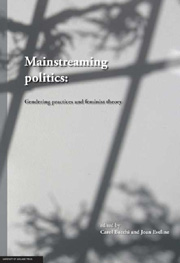Book contents
- Frontmatter
- Contents
- Preface
- Personal reflection
- Publisher's note
- List of authors and project personnel
- Acknowledgements
- Introduction
- 1 Gender/ing impact assessment: Can it be made to work?
- 2 Mainstreaming and neoliberalism: A contested relationship
- 3 Gender analysis and social change: Testing the water
- 4 What are we mainstreaming when we mainstream gender?
- 5 Approaches to gender mainstreaming: What's the problem represented to be?
- 6 Power, resistance and reflexive practice
- 7 Gender mainstreaming: The answer to the gender pay gap?
- 8 Gender analysis and community participation: The role of women's policy units
- 9 The invisibility of gendered power relations in domestic violence policy
- 10 Gender mainstreaming versus diversity mainstreaming: Methodology as emancipatory politics
- 11 University-public sector research collaboration: Mine the space, never mind the gap
- 12 Obeying organisational ‘rules of relevance’: Gender analysis of policy
- 13 Gender mainstreaming or diversity mainstreaming? The politics of ‘doing’
- Conclusion A politics of movement
- Author Index
- General Index
9 - The invisibility of gendered power relations in domestic violence policy
Published online by Cambridge University Press: 05 June 2012
- Frontmatter
- Contents
- Preface
- Personal reflection
- Publisher's note
- List of authors and project personnel
- Acknowledgements
- Introduction
- 1 Gender/ing impact assessment: Can it be made to work?
- 2 Mainstreaming and neoliberalism: A contested relationship
- 3 Gender analysis and social change: Testing the water
- 4 What are we mainstreaming when we mainstream gender?
- 5 Approaches to gender mainstreaming: What's the problem represented to be?
- 6 Power, resistance and reflexive practice
- 7 Gender mainstreaming: The answer to the gender pay gap?
- 8 Gender analysis and community participation: The role of women's policy units
- 9 The invisibility of gendered power relations in domestic violence policy
- 10 Gender mainstreaming versus diversity mainstreaming: Methodology as emancipatory politics
- 11 University-public sector research collaboration: Mine the space, never mind the gap
- 12 Obeying organisational ‘rules of relevance’: Gender analysis of policy
- 13 Gender mainstreaming or diversity mainstreaming? The politics of ‘doing’
- Conclusion A politics of movement
- Author Index
- General Index
Summary
Introduction: Joan Eveline and Carol Bacchi
A fervent debate in mainstreaming policy surrounds the question of whether ‘gender’ or ‘diversity’ should provide the main focus. Lurking behind that debate is the discursive practice of ‘commatisation’, highlighted by Mary O'Brien (1984) as the definitive blind spot of equal opportunity policy. With commatisation, the policy emphasis goes onto the disadvantages of ‘women (comma) blacks (comma) gays (comma) …’ etc. etc. and leaves the advantages available to the unspoken norm (white, male, straight etc.) hidden from view (Eveline 1994).
Although policymakers have tried replacing ‘women’ with ‘gender’ and the remainder of the commatised groups with ‘diversity’, the old dangers of commatisation remain. Most public servants who develop and implement policy still think ‘gender’ means ‘women’ (Chapters 3, 4 and 5), rather than an attributional process that maintains and obscures a masculinised ordering of privilege. And most of the groups who find themselves in the ‘diversity’ category see gender used invariably in white ethnocentric and heteronormative ways which obscure and sustain the cultural privileges that white heterosexual women take for granted in white racist homophobic societies.
Whether and how gender mainstreaming can adequately address this problem of commatisation was a key design question for our gender analysis project. As part of that design we initiated a PhD study dedicated to examining the interface between gender analysis and issues raised by Aboriginal communities in Western Australia.
- Type
- Chapter
- Information
- Mainstreaming PoliticsGendering Practices and Feminist Theory, pp. 215 - 236Publisher: The University of Adelaide PressPrint publication year: 2010



